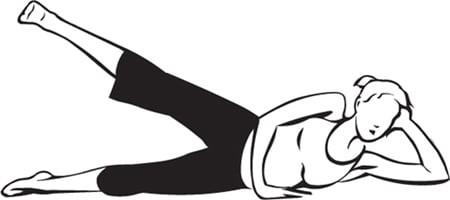12. Cystic Fibrosis
Cystic fibrosis (CF) is a genetic
disorder that causes digestive and breathing problems. It causes the
body to produce sticky mucus that builds up in the lungs, pancreas and
other organs, which can lead to respiratory and digestive problems.
Those with the disorder are usually diagnosed early in life.
We are now able to determine whether there
is a risk of having a baby with CF. You and your partner can be tested
before pregnancy to determine if either of you are
carriers. A test can also be done in the first and/or second trimester
of pregnancy to see if the baby has cystic fibrosis. Medical experts
urge Caucasians to have the CF test. It’s the most common birth defect
in this group. Screening is also recommended for others at higher risk
for CF, such as Ashkenazi Jews. The screening test uses a blood sample
or a saliva sample.
For your baby to have cystic fibrosis, both parents must be carriers. If only one parent is a carrier, the baby will not have CF. A carrier does not
have CF. You could be a carrier even if no one in your family has CF.
You could also be a carrier if you already have children and they do not
have CF. Your chance of carrying the gene for cystic fibrosis increases
if someone in your family has CF or is a known carrier.
Screening for Cystic Fibrosis. Screening for cystic fibrosis is often offered to couples as part of genetic counseling. One test available is called Cystic Fibrosis (CF) Complete Test. It can identify more than 1000 mutations of the CF gene. A panel that screens for 23 CF mutations is the recommended test.
If both of you carry the CF gene, your
baby will have a 25% chance of having cystic fibrosis. Your developing
baby can be tested during your pregnancy with chorionic villus sampling
around the 10th or 11th week of pregnancy. Amniocentesis may also be used to test the baby.
Some CF gene mutations cannot be detected
by the current test. This means you could be told you don’t carry the
gene, when in fact you do. The test cannot detect all CF mutations
because researchers don’t know all of them at this time. However,
unknown CF gene mutations are rare.
Late-night nutritious snacks are
beneficial for some women. However, for many women, snacking at night is
unnecessary. If you’re used to ice cream or other goodies before bed,
you may pay for it during pregnancy with excessive weight gain. Food in
your stomach late at night may also cause heartburn or indigestion.
If you believe cystic
fibrosis is a serious concern or if you have a family history of the
disease, talk to your healthcare provider. Testing is a personal
decision you and your partner must make.
Many couples choose not to have the test
because it would not change what they would do during the pregnancy. In
addition, they do not want to expose the mother-to-be or the developing
fetus to the risks of CVS or amniocentesis. However, testing is
recommended so care can be provided to baby after birth.
13. Exercise for Week 12
Lie on your left side, with your body in
alignment. Support your head with your left hand, and place your right
hand on the floor in front of you for balance. Inhale and relax. While
exhaling, slowly raise your right leg as high as you can without bending
your knee or your body. Keep your foot flexed. Inhale and slowly lower
your leg. Repeat on your right side. Do 10 times on each side. Tones and strengthens hip, buttock and thigh muscles.
